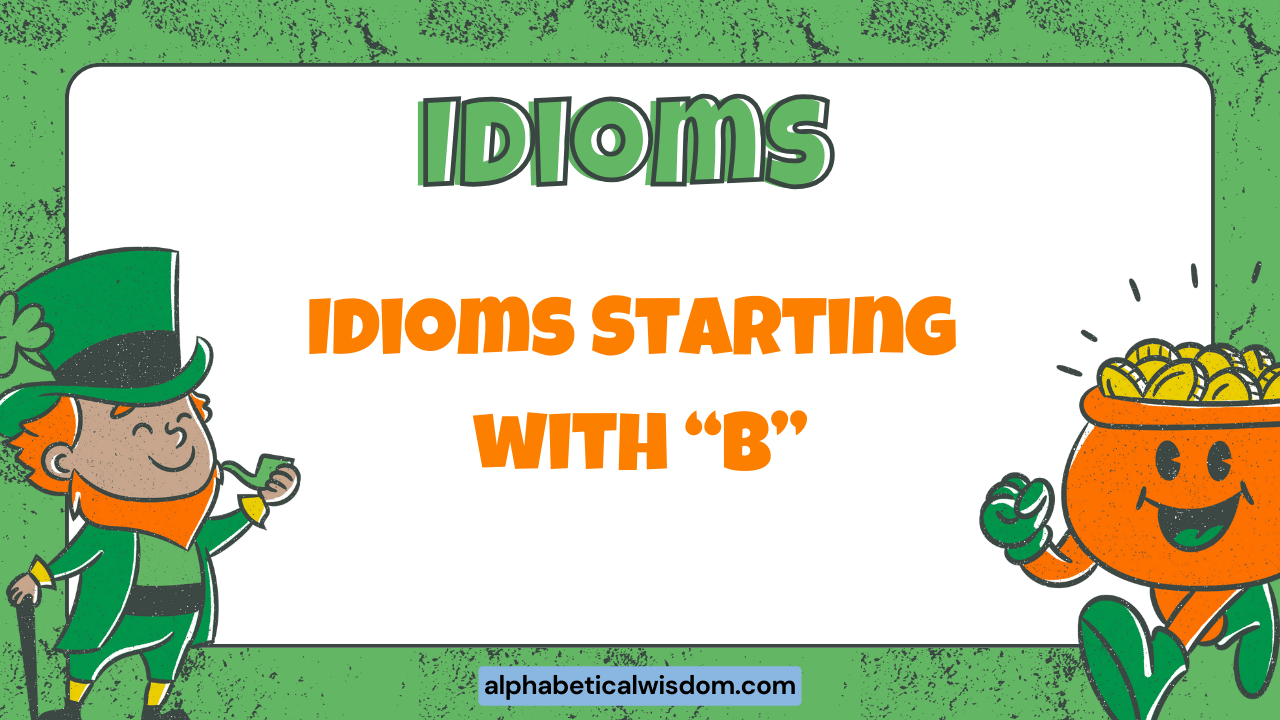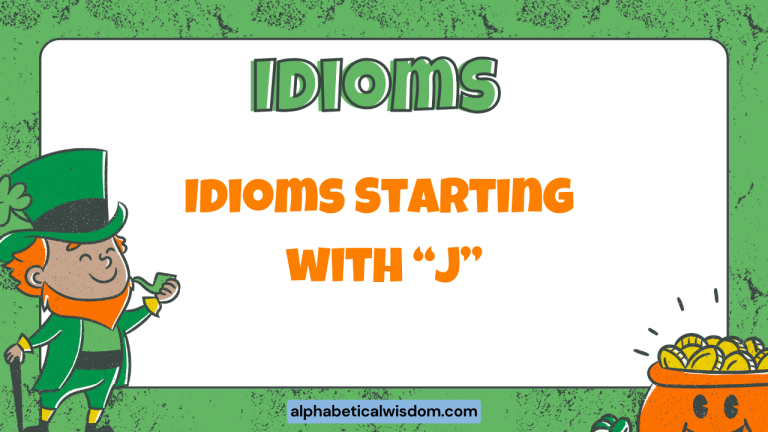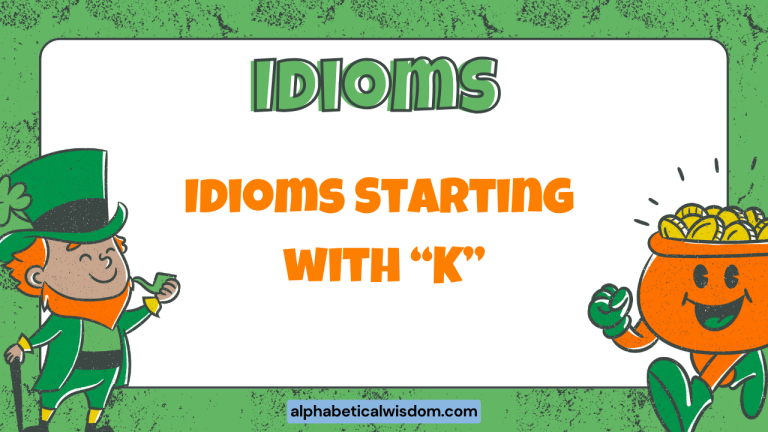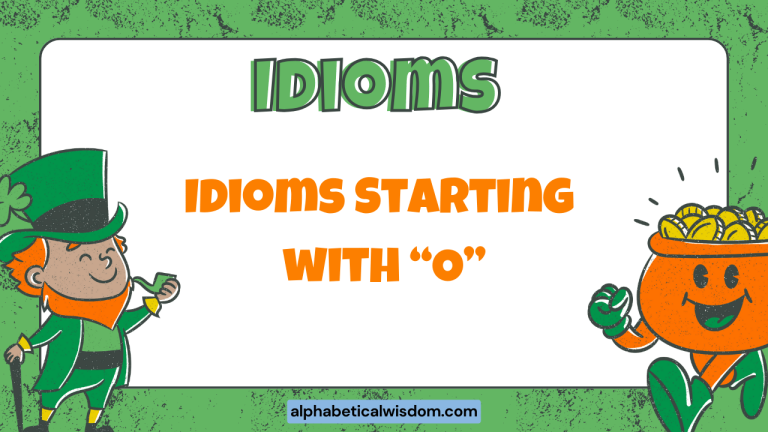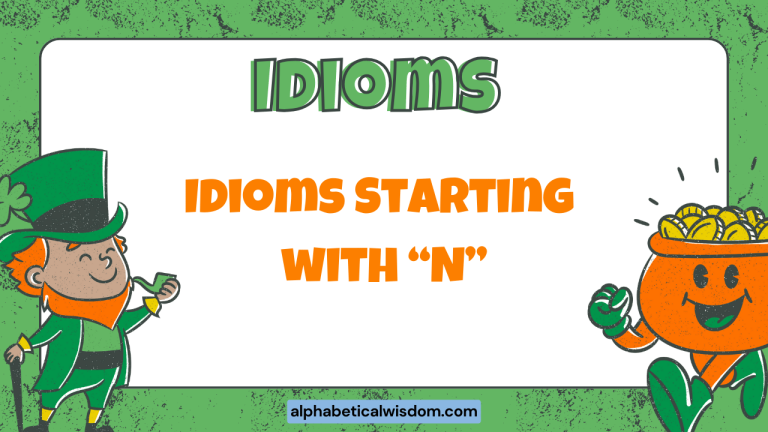Mastering Idioms: A Comprehensive Guide to “B” Idioms
Idioms enrich the English language, adding color and nuance to everyday communication. Understanding idioms, especially those starting with the letter “B,” is crucial for both native speakers and English language learners.
These expressions often convey meanings that differ significantly from the literal interpretations of their individual words. This article provides a comprehensive guide to “B” idioms, exploring their definitions, origins, and practical applications.
Mastering these idioms will enhance your comprehension, fluency, and overall communication skills, making you a more proficient and confident English speaker. This guide is suitable for intermediate to advanced English learners, ESL/EFL students, and anyone interested in expanding their knowledge of idiomatic expressions.
Table of Contents
Definition of Idioms
An idiom is a phrase or expression whose meaning cannot be understood from the literal meanings of its individual words. Instead, idioms have a figurative meaning that is known through common use.
They are a vital part of any language, reflecting cultural history, social customs, and everyday experiences. Understanding idioms is essential for effective communication, as they often convey emotions, attitudes, and subtle nuances that literal language cannot capture.
Idioms can be classified based on their structure, function, and the context in which they are used. Some idioms are metaphors, using imagery to convey a specific meaning.
Others are similes, comparing one thing to another to highlight a particular quality. Still, others are simply fixed expressions that have acquired a unique meaning over time.
Regardless of their specific form, idioms add richness and depth to language.
Structural Breakdown of Idioms
Idioms do not follow standard grammatical rules in terms of meaning, but they do have a fixed structure. This means that the words within an idiom cannot usually be changed or rearranged without altering or losing the idiom’s intended meaning.
The structure of an idiom often includes a combination of nouns, verbs, adjectives, and prepositions, arranged in a specific order. The grammatical structure itself is less important than the established combination of words and its accepted figurative meaning.
For example, the idiom “to beat around the bush” cannot be changed to “to hit around the bush” or “to beat near the bush” without losing its meaning. The specific words and their arrangement are crucial to the idiom’s recognition and understanding. Similarly, idioms often rely on specific verb tenses or prepositions to maintain their intended meaning. Understanding this structural rigidity is important for using idioms correctly in both spoken and written English.
Types and Categories of Idioms
Idioms can be categorized based on various criteria, including their grammatical structure, figurative meaning, and thematic content. Here are some common categories:
Grammatical Structure
- Phrasal Verbs: These consist of a verb and a preposition or adverb (e.g., “break down”).
- Prepositional Phrases: These include a preposition and a noun phrase (e.g., “by heart”).
- Clausal Idioms: These are short clauses or sentences that have a figurative meaning (e.g., “It’s raining cats and dogs”).
Figurative Meaning
- Metaphorical Idioms: These use metaphors to convey meaning (e.g., “a piece of cake”).
- Similes: These use “like” or “as” to compare two things (e.g., “as cool as a cucumber”).
- Hyperbolic Idioms: These use exaggeration for emphasis (e.g., “a million times”).
Thematic Content
- Idioms Related to Time: These refer to time or duration (e.g., “in the nick of time”).
- Idioms Related to Money: These pertain to financial matters (e.g., “break the bank”).
- Idioms Related to Emotions: These express feelings or attitudes (e.g., “bite your tongue”).
Examples of Idioms Starting with “B”
This section provides a comprehensive list of idioms starting with the letter “B,” categorized by their initial word. Each idiom is defined and illustrated with example sentences to help you understand its meaning and usage.
Idioms with “Be”
Idioms starting with “be” often express states of being, conditions, or actions related to existence and experience. These idioms are frequently used in everyday conversation to describe situations, feelings, and behaviors.
The following table presents a wide range of idioms that start with the word “be”, along with their definitions and example sentences. Understanding these idioms can significantly enhance your ability to comprehend and use English effectively.
| Idiom | Definition | Example Sentence |
|---|---|---|
| Be all ears | To be listening attentively. | “Tell me about your trip; I’m all ears.” |
| Be in the same boat | To be in the same difficult situation. | “We’re all losing money, so we’re in the same boat.” |
| Be beside oneself | To be overwhelmed with emotion (usually anger or grief). | “She was beside herself with worry when her son didn’t come home.” |
| Be a far cry from | To be very different from. | “This apartment is a far cry from the mansion they used to live in.” |
| Be a piece of cake | To be very easy. | “The exam was a piece of cake; I finished it in half an hour.” |
| Be a fly on the wall | To be able to observe something without being noticed. | “I’d love to be a fly on the wall during their meeting.” |
| Be a dark horse | A competitor that is unexpectedly successful. | “He entered the competition as a dark horse, but he won easily.” |
| Be an open book | To be easy to understand; to have no secrets. | “She’s an open book; you always know what she’s thinking.” |
| Be back to square one | To have to start over again. | “The project failed, so we’re back to square one.” |
| Be that as it may | Despite that; nevertheless. | “Be that as it may, we still need to find a solution.” |
| Be on cloud nine | To be extremely happy. | “She was on cloud nine after getting the job offer.” |
| Be up in the air | To be uncertain or undecided. | “Our travel plans are still up in the air.” |
| Be in two minds | To be unable to decide between two options. | “I’m in two minds about whether to accept the promotion.” |
| Be hard on someone | To criticize someone severely. | “Don’t be so hard on him; he’s trying his best.” |
| Be taken aback | To be surprised or shocked. | “I was taken aback by his sudden outburst.” |
| Be snowed under | To be extremely busy with a lot of work. | “I’m completely snowed under with paperwork this week.” |
| Be streets ahead | To be much better than someone or something. | “Their new product is streets ahead of the competition.” |
| Be tickled pink | To be very pleased or amused. | “She was tickled pink to receive such a thoughtful gift.” |
| Be touch and go | To be uncertain, with a risk of a bad outcome. | “His condition was touch and go for a few days, but he’s now recovering.” |
| Be worlds apart | To be very different in beliefs, ideas, or way of life. | “Their political views are worlds apart, so they often argue.” |
| Be given to | To have a tendency to do something. | “He is given to exaggeration, so don’t believe everything he says.” |
| Be intent on | To be determined to do something. | “She is intent on becoming a doctor, no matter how difficult it is.” |
| Be prone to | To be likely to do, have, or suffer from something. | “He is prone to catching colds in the winter.” |
| Be subject to | To be affected by or possibly affected by something. | “All imported goods are subject to customs inspection.” |
| Be up to no good | To be doing something wrong or mischievous. | “The children were very quiet; they must be up to no good.” |
Idioms with “Break”
Idioms containing the word “break” often relate to endings, interruptions, or violations. They can describe physical damage, emotional distress, or the termination of relationships or agreements.
The table below presents a variety of idioms that start with the word “break”, along with their definitions and illustrative example sentences. Understanding these idioms can enhance your ability to comprehend and use English effectively.
| Idiom | Definition | Example Sentence |
|---|---|---|
| Break a leg | Good luck (usually said to performers). | “You have your audition tonight? Break a leg!” |
| Break the ice | To make people feel more comfortable. | “Let’s play a game to break the ice at the meeting.” |
| Break the bank | To cost too much money. | “That new car is nice, but it would break the bank.” |
| Break someone’s heart | To cause someone emotional pain. | “He broke her heart when he ended the relationship.” |
| Break the news | To inform someone of important news (usually bad). | “I have to break the news to them that they didn’t get the job.” |
| Break a habit | To stop doing something that is a habit. | “It’s hard to break a habit like smoking.” |
| Break down | To stop working (of machines); to lose control of emotions. | “The car broke down on the highway.” “She broke down in tears when she heard the news.” |
| Break in | To enter a building illegally. | “Someone broke into our house last night.” |
| Break out | To escape; to suddenly start (e.g., a war or disease). | “The prisoners broke out of jail.” “A fire broke out in the building.” |
| Break up | To end a relationship. | “They decided to break up after five years together.” |
| Break even | To have neither a profit nor a loss. | “After paying all the expenses, we managed to break even.” |
| Break ground | To start building or constructing something; to innovate. | “They will break ground on the new stadium next month.” “Her research is breaking new ground in the field.” |
| Break with tradition | To do something differently from what is usually done. | “The new CEO decided to break with tradition and implement new policies.” |
| Break the mold | To be different and innovative. | “Her art is breaking the mold and inspiring many young artists.” |
| Break ranks | To act independently and against the established order. | “Some members of the party broke ranks and voted against the bill.” |
| Break cover | To emerge from a hiding place. | “The suspect broke cover and ran when he saw the police.” |
| Break one’s fall | To cushion a fall to prevent injury. | “The soft snow helped break his fall when he slipped on the ice.” |
| Break the back of something | To complete the most difficult part of a task. | “We’ve broken the back of the project, so the rest should be easier.” |
| Break wind | To fart (a polite way to say it). | “He accidentally broke wind during the yoga class.” |
| Break promises | To fail to do what you promised. | “He always break promises, so I don’t trust him anymore.” |
| Break stride | To lose momentum or rhythm. | “He broke stride when he tripped, but he quickly recovered and finished the race.” |
| Break silence | To speak after a period of silence. | “After a long silence, she finally broke silence and spoke about her experience.” |
| Break ground | To start or initiate something new. | “This technology is expected to break ground in the medical field.” |
| Break new ground | To discover or do something new. | “Her research is breaking new ground in cancer treatment.” |
| Break a code | To decipher a secret message. | “The detective managed to break the code and uncover the spy’s identity.” |
Idioms with “Bring”
Idioms with “bring” often involve causing something to happen, influencing a situation, or introducing a topic. They are commonly used to describe actions that have a consequential effect.
The following table provides several idioms that use the word “bring,” along with their meanings and example sentences. Understanding these idioms will help you to enhance your vocabulary and express yourself more effectively.
| Idiom | Definition | Example Sentence |
|---|---|---|
| Bring home the bacon | To earn a living; to be successful. | “He works long hours to bring home the bacon for his family.” |
| Bring to the table | To provide something useful or valuable. | “She brings a lot of experience to the table.” |
| Bring up | To raise a child; to introduce a topic. | “They brought up their children in the countryside.” “Don’t bring up that topic again.” |
| Bring about | To cause something to happen. | “The new policy brought about significant changes in the company.” |
| Bring down | To cause someone to lose power; to reduce something. | “The scandal brought down the government.” “We need to bring down the cost of production.” |
| Bring someone around | To persuade someone to agree with you. | “I finally brought him around to my way of thinking.” |
| Bring something to light | To reveal or make something known. | “The investigation brought new facts to light.” |
| Bring into play | To make something have an effect or be considered. | “The new regulations bring into play a number of important considerations.” |
| Bring to fruition | To successfully complete something. | “After years of hard work, they finally brought their project to fruition.” |
| Bring someone to justice | To arrest and prosecute someone for a crime. | “The police are determined to bring the criminals to justice.” |
| Bring shame on | To cause dishonor or disgrace. | “His actions brought shame on his family.” |
| Bring grist to the mill | To provide useful material or opportunity. | “The scandal brought grist to the mill for the opposition party.” |
| Bring the house down | To cause a strong positive reaction from an audience. | “The comedian’s performance brought the house down.” |
| Bring out the best (in someone) | To cause someone to show their best qualities. | “Her support brings out the best in him.” |
| Bring back memories | To cause someone to remember something. | “This old photograph brings back memories of my childhood.” |
| Bring in | To introduce a new law or product; to earn money. | “The new government plans to bring in stricter environmental laws.” “The company brought in a lot of revenue this year.” |
| Bring forward | To move something to an earlier date or time. | “The meeting has been brought forward to next Tuesday.” |
| Bring oneself to do something | To force oneself to do something unpleasant. | “I couldn’t bring myself to tell her the bad news.” |
| Bring down the curtain | To end a performance or event. | “The final song brought down the curtain on a fantastic concert.” |
| Bring into line | To make someone or something conform to a particular standard. | “The company is working to bring its practices into line with international standards.” |
| Bring to a head | To reach a crisis point. | “The argument finally brought the tensions to a head.” |
| Bring into disrepute | To damage the reputation of someone or something. | “His actions have brought the profession into disrepute.” |
| Bring to bear | To exert influence or pressure. | “They brought their influence to bear on the decision.” |
| Bring to pass | To cause something to happen. | “The events brought to pass a new era of peace.” |
| Bring home | To make someone fully realize something. | “The documentary really brought home the reality of poverty.” |
Idioms with “Burn”
Idioms with “burn” often connote intensity, destruction, or rapid consumption. They can describe physical processes, emotional states, or the depletion of resources.
The following table lists idioms that include the word “burn,” along with their definitions and example sentences. Learning these idioms will improve your understanding and use of the English language.
| Idiom | Definition | Example Sentence |
|---|---|---|
| Burn the midnight oil | To work late into the night. | “I had to burn the midnight oil to finish the report.” |
| Burn bridges | To destroy relationships. | “He burned bridges when he left the company on bad terms.” |
| Burn a hole in your pocket | Money that you want to spend quickly. | “That bonus is burning a hole in my pocket.” |
| Burn with curiosity | To be very curious. | “I’m burning with curiosity to know what happened.” |
| Burn up | To destroy something completely by fire; to use energy quickly. | “The rocket burned up in the atmosphere.” “The car burns up a lot of gas.” |
| Burn the candle at both ends | To work very hard and get very little rest. | “He’s been burning the candle at both ends trying to get the project done.” |
| Burn rubber | To accelerate quickly in a vehicle, making the tires squeal. | “He burned rubber as he sped away from the scene.” |
| Burn someone in effigy | To burn a likeness of someone as a form of protest. | “The protesters burned the politician in effigy.” |
Idioms with “Bite”
Idioms with “bite” often involve sharp reactions, suppression of words, or being deceived. They can describe both physical and emotional responses.
The following table presents idioms containing the word “bite,” along with their meanings and example sentences. Understanding these idioms can broaden your understanding of English idiomatic expressions.
| Idiom | Definition | Example Sentence |
|---|---|---|
| Bite the bullet | To face a difficult situation with courage. | “I had to bite the bullet and accept the pay cut.” |
| Bite your tongue | To avoid saying something that might be offensive. | “I wanted to argue, but I bit my tongue.” |
| Bite off more than you can chew | To take on a task that is too difficult. | “He bit off more than he could chew when he volunteered for the project.” |
| Bite someone’s head off | To speak angrily to someone. | “He bit my head off when I asked a simple question.” |
Idioms with “Blow”
Idioms with “blow” frequently imply forceful movement, missed opportunities, or sudden events. They can describe everything from wind to emotions to plans gone awry.
The table below features a collection of idioms that use the word “blow,” along with their definitions and example sentences. Learning these idioms will help you to expand your vocabulary and express yourself more effectively.
| Idiom | Definition | Example Sentence |
|---|---|---|
| Blow off steam | To release pent-up energy or frustration. | “He went for a run to blow off steam.” |
| Blow your own horn | To boast about your achievements. | “She’s always blowing her own horn about how successful she is.” |
| Blow something out of proportion | To exaggerate the importance of something. | “The media blew the incident out of proportion.” |
| Blow over | To fade away or be forgotten. | “The scandal will blow over in a few weeks.” |
| Blow a fuse | To become very angry. | “He blew a fuse when he saw the damage to his car.” |
| Blow the whistle | To report illegal or unethical activity. | “He blew the whistle on the company’s fraudulent practices.” |
| Blow hot and cold | To alternate between enthusiasm and disinterest. | “She blows hot and cold about the project, making it hard to plan.” |
| Blow a kiss | To express affection by blowing a kiss. | “She blew a kiss to her children as she left.” |
Idioms with “Build”
Idioms with “build” typically refer to creation, development, or growth. They can describe both physical structures and abstract concepts.
The following table presents a variety of idioms that start with the word “build”, along with their definitions and illustrative example sentences. Understanding these idioms can enhance your ability to comprehend and use English effectively.
| Idiom | Definition | Example Sentence |
|---|---|---|
| Build castles in the air | To make unrealistic plans or dreams. | “He spends too much time building castles in the air instead of working.” |
| Build bridges | To improve relationships between people or groups. | “The company is trying to build bridges with the local community.” |
| Build up | To increase gradually; to strengthen. | “He’s been building up his savings for years.” “Regular exercise helps build up your immune system.” |
| Build on | To develop or expand on something. | “We need to build on our past successes.” |
Idioms with “Bury”
Idioms with “bury” often involve hiding, suppressing, or putting something to rest. They can describe both physical actions and emotional states.
The table below features a collection of idioms that use the word “bury,” along with their definitions and example sentences. Learning these idioms will help you to expand your vocabulary and express yourself more effectively.
| Idiom | Definition | Example Sentence |
|---|---|---|
| Bury the hatchet | To make peace after a disagreement. | “They decided to bury the hatchet and work together.” |
| Bury your head in the sand | To ignore or avoid a problem. | “He’s burying his head in the sand and pretending the problem doesn’t exist.” |
| Bury the lead | To start with less important information. | “The reporter buried the lead by starting with background information instead of the main point.” |
Idioms with “By”
Idioms with “by” often indicate methods, proximity, or time. They can describe how something is done, where something is located, or when something happens.
The following table presents a variety of idioms that start with the word “by”, along with their definitions and illustrative example sentences. Understanding these idioms can enhance your ability to comprehend and use English effectively.
| Idiom | Definition | Example Sentence |
|---|---|---|
| By and large | Generally; on the whole. | “By and large, the event was a success.” |
| By heart | From memory. | “He knows the poem by heart.” |
| By all means | Certainly; of course. | “Can I borrow your pen? By all means.” |
| By the way | Incidentally; used to introduce a new topic. | “By the way, did you hear about the new project?” |
| By a hair’s breadth | By a very small margin. | “He won the race by a hair’s breadth.” |
| By hook or by crook | By any means necessary. | “I’m determined to finish this project, by hook or by crook.” |
| By leaps and bounds | Rapidly; significantly. | “Her English has improved by leaps and bounds.” |
| By virtue of | Because of. | “He was promoted by virtue of his hard work.” |
Idioms with “Begin”
Idioms with “begin” typically refer to starting something new or initiating a process. They often describe the initial stages of an action or event.
The following table presents a variety of idioms that start with the word “begin”, along with their definitions and illustrative example sentences. Understanding these idioms can enhance your ability to comprehend and use English effectively.
| Idiom | Definition | Example Sentence |
|---|---|---|
| Begin at the beginning | To start from the very start. | “Let’s begin at the beginning so everyone understands the context.” |
Usage Rules for Idioms
Using idioms correctly involves understanding their specific meanings and contexts. Here are some important rules to follow:
- Context is Key: Idioms should be used in situations where their figurative meaning is appropriate. Using an idiom in the wrong context can lead to confusion or miscommunication.
- Fixed Structure: Idioms generally have a fixed structure, meaning that the words cannot be changed or rearranged. Altering the structure of an idiom can change or obscure its meaning.
- Audience Awareness: Be mindful of your audience when using idioms. Some idioms may be unfamiliar to non-native speakers or those from different cultural backgrounds.
- Tense Consistency: Ensure that the verb tenses within an idiom are consistent with the intended meaning and grammatical context.
- Do Not Overuse: While idioms can enrich your language, overuse can make your speech sound unnatural or contrived. Use them sparingly and appropriately.
Common Mistakes with Idioms
Many learners make common mistakes when using idioms. Here are some frequent errors and how to avoid them:
| Incorrect | Correct | Explanation |
|---|---|---|
| “He is hearing all ears.” | “He is all ears.” | The idiom is “all ears,” not “hearing all ears.” |
| “She broke his heart in a million pieces.” | “She broke his heart.” | The idiom is “break someone’s heart,” not “break his heart in a million pieces.” |
| “They are in the same ship.” | “They are in the same boat.” | The idiom is “in the same boat,” not “in the same ship.” |
| “He burned his bridges behind him.” | “He burned his bridges.” | The idiom is “burn bridges,” not “burn his bridges behind him.” |
| “Bite more than you can eat.” | “Bite off more than you can chew.” | The idiom is “bite off more than you can chew,” not “bite more than you can eat.” |
Practice Exercises
Test your understanding of “B” idioms with these practice exercises. Fill in the blanks with the correct idiom from the list provided.
- After the argument, they decided to __________ and become friends again. (bury the hatchet, break the ice, bring home the bacon)
Answer
bury the hatchet
- He had to __________ and accept the fact that he failed the exam. (bite the bullet, blow off steam, build castles in the air)
Answer
bite the bullet
- She __________ when her favorite team lost the game. (blew a fuse, burned bridges, brought down the house)
Answer
blew a fuse
- He works hard every day to __________ for his family. (break the bank, bring home the bacon, be all ears)
Answer
bring home the bacon
- The project was so simple; it was a __________. (be a fly on the wall, be a piece of cake, be back to square one)
Answer
be a piece of cake
Advanced Topics in Idiom Usage
For advanced learners, understanding the nuances of idiom usage is crucial. Here are some advanced topics to consider:
- Idiomatic Variation: Some idioms have regional variations or slightly different forms. Understanding these variations can help you communicate more effectively in diverse settings.
- Cultural Context: Idioms are often rooted in cultural history and social customs. Exploring the cultural context of an idiom can provide deeper insights into its meaning and usage.
- Idiomatic Creativity: While idioms generally have a fixed structure, skilled writers and speakers can sometimes creatively adapt or modify idioms to create new meanings or effects.
- Translation Challenges: Idioms are notoriously difficult to translate directly. Understanding the challenges of idiomatic translation can help you appreciate the unique qualities of different languages.
Frequently Asked Questions
Why are idioms important in English?
Idioms enhance communication by adding color, emotion, and nuance. They reflect cultural insights and are essential for understanding native speakers.
How can I learn idioms effectively?
Learn idioms in context, use flashcards, practice regularly, and immerse yourself in English media to see how native speakers use them.
Are idioms the same in all English-speaking countries?
No, idioms can vary by region. For example, idioms used in the United States might differ from those used in the United Kingdom or Australia.
Is it okay to use idioms in formal writing?
It depends on the context. While idioms can add flavor to informal writing, they should be used sparingly in formal writing to maintain a professional tone.
Conclusion
Mastering idioms starting with the letter “B” can significantly enhance your English language skills. By understanding their definitions, origins, and usage rules, you can communicate more effectively and confidently.
Continue to practice and explore new idioms to further enrich your vocabulary and linguistic abilities. Idioms are a window into the culture and history of a language, and mastering them will not only improve your language skills but also deepen your appreciation for the English language.
